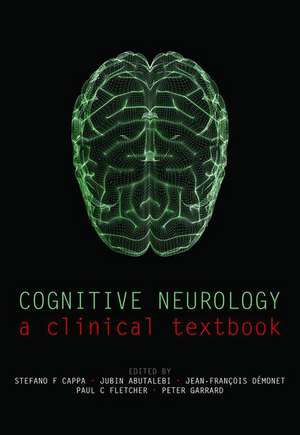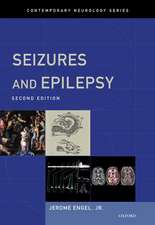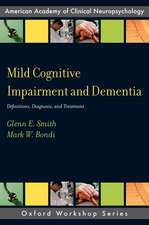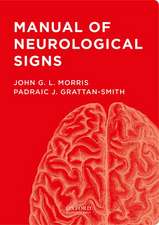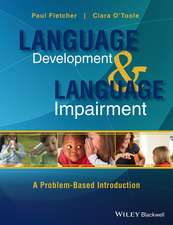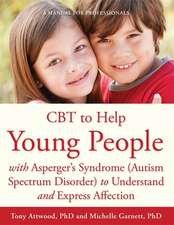Cognitive Neurology: A clinical textbook
Editat de Stefano Cappa, Jubin Abutalebi, Jean-Francois Demonet, Paul Fletcher, Peter Garrarden Limba Engleză Hardback – 28 feb 2008
Preț: 905.06 lei
Preț vechi: 1241.39 lei
-27% Nou
Puncte Express: 1358
Preț estimativ în valută:
173.24€ • 188.24$ • 145.61£
173.24€ • 188.24$ • 145.61£
Carte tipărită la comandă
Livrare economică 10-16 aprilie
Preluare comenzi: 021 569.72.76
Specificații
ISBN-13: 9780198569275
ISBN-10: 0198569270
Pagini: 538
Ilustrații: 29 line drawings; 20 black & white photos; 23 colour photos
Dimensiuni: 177 x 254 x 31 mm
Greutate: 1.2 kg
Editura: OUP OXFORD
Colecția OUP Oxford
Locul publicării:Oxford, United Kingdom
ISBN-10: 0198569270
Pagini: 538
Ilustrații: 29 line drawings; 20 black & white photos; 23 colour photos
Dimensiuni: 177 x 254 x 31 mm
Greutate: 1.2 kg
Editura: OUP OXFORD
Colecția OUP Oxford
Locul publicării:Oxford, United Kingdom
Recenzii
...a first-rate, informative new book on clinical cognitive neuroscience. Written and edited by a cohort of internationally recongized clinician-scientists, this book is an outstanding contribution to the field. A brilliant new book...and a must read for anyone interested in neuropsychiatriy and behavioural neurology.
Notă biografică
Stefano F. Cappa received his M.D. at the University of Milano, where he completed his neurology training. He has held assistant professor and associate professor positions in neurology and neurological rehabilitation at the University of Brescia. He has been professor of neuropsychology at the Vita Salute S. Raffaele University in Milano, Italy since 1999 and, since Nov 2000, Dean of Psychology. He is also Director of the Neurology Department of S. Raffaele Turro Hospital, Milano, Italy. His main research interests are: the investigations in linguistic aspects of aphasia, with a special emphasis on the neurological correlates of specific aspects of language impairment; Alzheimer's disease and dementia: diagnosis, unusual neuropsychological features, cognitive studies of memory disorders in dementia; the application of functional imaging methods (positron emission tomography, functional magnetic resonance) to the study of cognitive function (in particular, language and semantic memory).Jubin Abutalebi is a cognitive neurologist and a contracted professor at the Psychology Faculty of the University Vita Salute in Milan. His research focus on linguistic aspects of aphasia in mono- and bi-linguals, with a special emphasis on the neurological correlates of language impairment as studied with functional neuroimaging. Dr Abutalebi is internationally known for his landmark studies on the neural correlates of languages in bilinguals.Jean-François Démonet was trained as an MD and neurologist at Toulouse University. He completed his training in neuropsychology at Montreal University and the MRC Cyclotron Unit (London) under R. Frackowiak. He is currently "Directeur de Recherche" heading a research team at the INSERM Unit U825, Purpan University Hospital in Toulouse. The main research topics are the neural correlates of various language-related functions such as categorical processes in perception and production of language, and memory/language interactions. These topics are addressed in studies of brain functions in non-brain-damaged subjects as well as in patients suffering from various language dysfunctions (aphasia, dyslexia), perception dysfunction (e.g. visual agnosia), and neuro-degenerative diseases. In each of these contexts, the approach combines behavioural studies based on cognitive neuropsychology principles, and neuroimaging studies using the various brain imaging techniques that are available on site.Paul Fletcher trained in medicine and then psychiatry in London. He subsequently worked at the Hammersmith Hospital and later at the Wellcome Department of Cognitive Neurology, London, carrying out a set of studies on the contributions of frontal lobes to memory in health and mental illness. After an attachment at the Institute for Brain Research, Dusseldorf, he took up a position in the Department of Psychiatry, Cambridge University on a Wellcome Trust-funded senior Fellowship. His research explores the neurobiology of human learning and memory in health and disease. In particular, he is interested in how abnormal brain activity during learning may underlie some of the distressing symptoms associated with psychiatric illnesses.Peter Garrard is a senior lecturer and honorary consultant neurologist in the department of Clinical Neurosciences at the Royal Free Hospital, London
